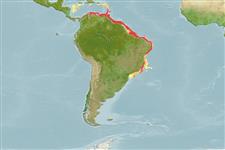Environment: milieu / climate zone / depth range / distribution range
Ekologi
marina bottenlevande; djupintervall 0 - 110 m (Ref. 6902), usually ? - 80 m (Ref. 50163). Subtropical; 18°N - 27°S, 82°W - 33°W (Ref. 114953)
Western Atlantic: Caribbean to Brazil, and possibly further south to northern Argentina (Ref. 114953). Eastern Atlantic: tropical waters of West Africa.
Length at first maturity / Size / Vikt / Age
Maturity: Lm 54.7 range ? - ? cm
Max length : 100.0 cm WD hane/ej könsbestämd; (Ref. 5217); common length : 70.0 cm WD hane/ej könsbestämd; (Ref. 5217); publicerad maxvikt: 955.10 g (Ref. 118626)
Shorter nostrils, no enlarged tubercles on the tip of the snout. Olive gray, reddish brown or chocolate brown. Pale translucent area on either side of rostral ridges. Darker brown spots or blotches on sides. Lower surface pale yellowish, greyish or dusky white, tip of the snout with a more or less conspicuous sooty blotch (Ref. 6902).
Found on shallow, soft bottoms. Ovoviviparous (Ref. 50449). Flesh considered low quality (Ref. 5217). Traded as an aquarium fish at Ceará, Brazil (Ref. 49392).
Exhibit ovoviparity (aplacental viviparity), with embryos feeding initially on yolk, then receiving additional nourishment from the mother by indirect absorption of uterine fluid enriched with mucus, fat or protein through specialised structures (Ref. 50449).
Cervigón, F., R. Cipriani, W. Fischer, L. Garibaldi, M. Hendrickx, A.J. Lemus, R. Márquez, J.M. Poutiers, G. Robaina and B. Rodriguez, 1992. Fichas FAO de identificación de especies para los fines de la pesca. Guía de campo de las especies comerciales marinas y de aquas salobres de la costa septentrional de Sur América. FAO, Rome. 513 p. Preparado con el financiamento de la Comisión de Comunidades Europeas y de NORAD. (Ref. 5217)
IUCN Red List Status (Ref. 130435)
Threat to humans
Harmless
Human uses
Fiskeri: kommersiell; Akvarium: Kommersiell
Verktyg
Special reports
Download XML
Internet-källor
Estimates based on models
Preferred temperature (Ref.
123201): 19.2 - 28, mean 26.7 °C (based on 456 cells).
Phylogenetic diversity index (Ref.
82804): PD
50 = 0.5039 [Uniqueness, from 0.5 = low to 2.0 = high].
Bayesian length-weight: a=0.00288 (0.00173 - 0.00480), b=3.09 (2.94 - 3.24), in cm total length, based on LWR estimates for this species & Genus-body shape (Ref.
93245).
Trofisk nivå (Ref.
69278): 3.6 ±0.5 se; based on diet studies.
Resiliens (Ref.
120179): Låg, lägsta populationsfördubblingstid 4,5-14 år (Fec = 2-13).
Fishing Vulnerability (Ref.
59153): High vulnerability (65 of 100).
Climate Vulnerability (Ref.
125649): High to very high vulnerability (66 of 100).
Nutrients (Ref.
124155): Calcium = 25.4 [5.0, 117.1] mg/100g; Iron = 0.733 [0.188, 2.110] mg/100g; Protein = 19.3 [17.2, 21.2] %; Omega3 = 0.221 [0.099, 0.473] g/100g; Selenium = 25 [7, 69] μg/100g; VitaminA = 7.74 [2.72, 21.32] μg/100g; Zinc = 0.582 [0.290, 1.051] mg/100g (wet weight);
